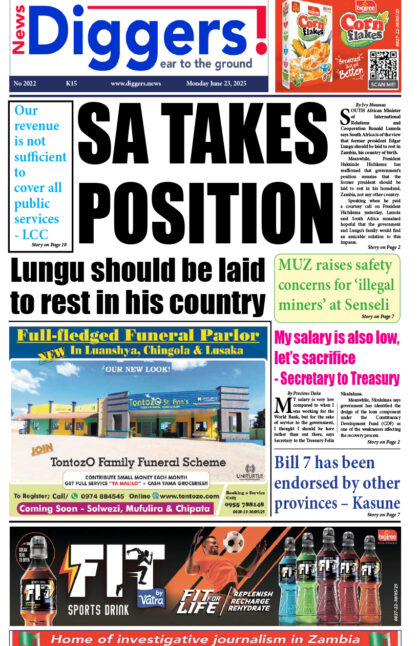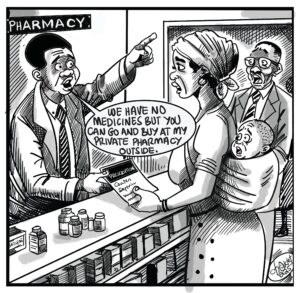Economist Chibamba Kanyama says the African Development Bank’s sanctions on Zambia have dented the country’s reputation.
The African Development Bank (AfDB) has imposed sanctions on Zambia for non-payment of a US$1.4 million debt, which the government assured will be settled in due course and that there was no reason for the nation to panic on the matter.
Zambia joins Zimbabwe, Somalia and Sudan on the list of blacklisted countries.
The Ministry of Finance stated, Tuesday, that government’s default should not be a cause for alarm or panic by any stakeholder, stressing that the US $1.4 million balance will be cleared in due course.
“Government wishes to inform the nation that the information circulating on social media to the effect that the AfDB has put Zambia under sanctions for failing to repay loans should not cause any panic. Government acknowledges that the AfDB Group did write to the Ministry of Finance, yesterday, December 23, 2019, to inform the Ministry that as of yesterday (Monday) the Bank had not received full payment in respect of Bank Group bills. The Bank Group added that, in accordance with the Bank Group policy on loan arrears recovery, it wished to inform government that sanctions had been imposed on December 15, 2019. It was further stated that the Bank Group counted on government’s prompt action for the timely settlement of the amounts due to enable the lifting of sanctions,” disclosed the Ministry.
However, Kanyama said the sanctions were not healthy for Zambia’s reputation considering that the amount owed to AfDB was not too large for government to settle, “which will indicate that the government is broke to even settle small recurring repayments”.
“First of all, I consider this latest piece of information on the sanctions imposed on Zambia by the African Development Bank to be market sensitive information. I am not sure about the protocols that govern bilateral debt arrangements but the public disclosure of default and eventual sanctions is not a healthy thing for Zambia’s reputation. From the day we accessed commercial loans in the form of Eurobonds, anything about Zambian debt is market sensitive. Investors have been speculating that Zambia would default on its bullet payments…This is more so the amount involved is not that large to settle when due for any government but this whole issue will be taken as though government is so broke it cannot settle even small recurring repayments,” Chibamba said.
He said the AfDB was the last financier the government would want to make unhappy as the conditionality of lending from the bank is far more responsive to the needs of the country.
“My thought is that even though the exchange rate has had an impact on government’s failure to duly meet the obligation, it could also be because of pressure government is currently facing in meeting various financial demands. The 2019 budget closes in the next [one] week but pressures to fund various government agencies and other public sector needs are humongous. In other words, it may have been an oversight on the part of technocrats at the Ministry of Finance. Remember that Zambia and the AfDB have had one of the perfect relationships in development finance,” Kanyama added,
“Even when Zambia’s profile was being questioned in the past few years for its worrying external debt position…the AfDB has been pumping money into Zambia. This means the Bank is the last financier we would want to make unhappy. Their conditionality for lending is far more responsive to the needs of the country than many other creditors we know. It is against this backdrop [that] I am hopeful the government will promptly settle the amount and other future scheduled repayments. I am also hoping this is the last time we will have such information in public domain.”
He further called for measures to ensure that the country maintains a stable exchange rate to ensure both public and private debts remained sustainable.
“Perhaps the public now knows what the impact of currency devaluation does to a country heavy on external debts. A volatile exchange rate has potential to wreck a country’s credit profile. Many companies in Zambia I have had the opportunity to engage lately are projecting an exchange rate of around 15-16 per cent in 2020. We will do extremely well as a country to maintain our exchange rate at less than 14 per cent so that our public debt on the part of government as well as private debt by private companies remain sustainable,” said Kanyama.




















One Response
I agree with much of Chibamba’s assessment except one point. Chibamba is wrong when he says that such information about government default should not be exposed to the public. The Zambian public has every right to know the financial status, financial behaviour of our government, and how the government is spending our financial resources. In any case, the money that the government uses to repay debt (whether foreign or local debt) is our money, taxpayers’ money. For government to fail to pay such a small amount of money means Zambia is broke! Period. Thanks to the media for exposing this fact and the financial inabilities of this financially reckless government. Chibamba contradicts himself when he says “perhaps the public now knows what the impact of currency devaluation does to a country heavy on external debt.” How else could we have known about this if this information was not brought into the public domain, as he wishes?